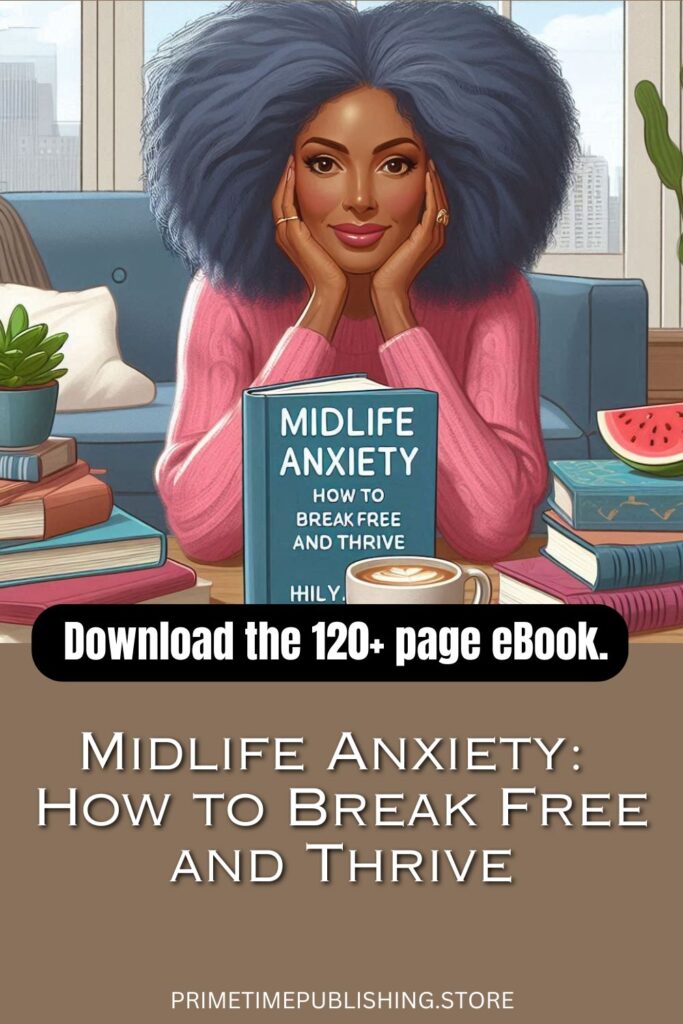 Midlife anxiety? Oh yes, it’s real, and if you’re experiencing it, you’re certainly not alone. It’s not just something that happens to “other people.” I know because I’ve been there.
Midlife anxiety? Oh yes, it’s real, and if you’re experiencing it, you’re certainly not alone. It’s not just something that happens to “other people.” I know because I’ve been there.
There’s something about hitting that big 4-0 (or 5-0, or any milestone, really) that opens the floodgates of existential questions.
Suddenly, every decision you’ve ever made comes under scrutiny. What have I done with my life? Where am I headed? Is it too late to change things?
The good news is, you’re not stuck. You can break free from midlife anxiety and learn to thrive during this stage. Let’s explore why midlife can trigger anxiety and, more importantly, how you can reclaim your peace of mind.
What Causes Midlife Anxiety?
If you’re anything like me, midlife didn’t just creep up on you—it barged in, threw a bunch of existential questions in your face, and laughed while you scrambled for answers. But here’s the reality: midlife comes with its own set of stressors that can significantly impact mental well-being. Let’s break them down:
1. Career and Purpose
By midlife, many of us have built careers and reached certain milestones. But as time goes on, you may start to question whether this path is still the right one. Suddenly, you’re not just working for a paycheck—you want meaning. You might feel trapped in a job that no longer excites you, or you could be struggling with fears about not achieving enough. It feels like all your life decisions are up for a performance review.
- Why it’s stressful: The looming sense of “time running out” to achieve your goals, combined with daily job demands, can lead to intense pressure and anxiety.
2. Aging Parents and Family Pressures
Midlife often places us squarely in the “sandwich generation”—caring for aging parents while still supporting our own children. The emotional and physical toll of caregiving can be enormous. Between medical appointments, financial concerns, and the emotional weight of watching your parents age, it can feel like there’s no room left for you.
- Why it’s stressful: Balancing your career, children, and caregiving responsibilities can lead to feelings of burnout. The emotional strain of seeing parents become more dependent is often a difficult and anxiety-inducing experience.
3. Menopause Madness
If you’re reading this post, I KNOW you can relate to this term.
For women, menopause can be a significant cause of midlife anxiety. The hormonal changes associated with menopause can lead to mood swings, irritability, sleep disruptions, and heightened anxiety. These physical and emotional symptoms can disrupt your daily routine and sense of well-being, making you feel like your body is out of control.
- Why it’s stressful: Menopause adds another layer of unpredictability to midlife. As if balancing career and family isn’t enough, menopause comes in with hot flashes, insomnia, mood swings, and about a thousand other symptoms, leaving many women feeling physically and emotionally drained.
I vividly remember grappling with the challenges of menopause. At first, it felt like my body was betraying me, but once I learned to acknowledge what was happening and take steps to manage it, my anxiety started to lift.
4. Health Concerns
Midlife is when health issues—both our own and those of loved ones—often become more prominent. Regular check-ups, new aches and pains, and the looming reality of aging can trigger anxiety. The fear of illness or declining physical health can become a constant worry.
- Why it’s stressful: Health concerns often feel like they come out of nowhere, adding stress about what the future holds. Anxiety can build up when you feel like your body is no longer as resilient as it once was.
5. Reflection on Past Choices
Midlife tends to be a period of reflection, and this can bring up feelings of regret or dissatisfaction. Many of us look back and wonder, Did I make the right choices? Could I have done more? When you realize that some dreams didn’t pan out, or your life hasn’t followed the path you once imagined, it can lead to anxiety about whether it’s too late to change direction.
- Why it’s stressful: This type of introspection can lead to what’s commonly referred to as a “midlife crisis,” where feelings of regret or fear of lost opportunities weigh heavily on your mental health.
How Midlife Anxiety Shows Up
Midlife anxiety doesn’t always look like traditional panic attacks (though that can happen too). Often, it sneaks in through subtler signs:
- Restlessness: You feel like you should be doing something, but you’re not quite sure what. You might start new hobbies or projects, only to lose interest quickly.
- Difficulty Sleeping: It’s hard to shut your mind off at night, as thoughts race about everything from work to family to health.
- Feeling Trapped: You want to make big changes—maybe switch careers or move to a new place—but feel like the responsibilities of midlife are holding you back.
- Irritability: Little things get under your skin. It’s not just the minor annoyances themselves; it’s the underlying stress that you can’t quite shake.
Trust me, I’ve been there. I used to lie awake at night wondering if I had made the right decisions, replaying moments in my head.
But here’s the thing: you can break free from midlife anxiety.
How to Break Free from Midlife Anxiety
Now for the good part: how to take control of midlife anxiety and not just survive—but thrive. These are the strategies that helped me navigate the stress of midlife.
1. Reframe Your Mindset
The first step to overcoming midlife anxiety is changing how you view this phase of life. Instead of seeing midlife as a time of decline or stagnation, try to see it as a fresh chapter. You’ve accumulated decades of wisdom and experience, and you still have plenty of time to explore new passions and set new goals.
- How to do it: When negative thoughts creep in—like “I’m running out of time” or “It’s too late to make changes”—replace them with positive affirmations. Something as simple as, “I have the wisdom and experience to navigate this phase of life,” can shift your entire perspective.
For me, the simple act of viewing midlife as an opportunity instead of a limitation made all the difference. Life wasn’t over; it was just entering a new chapter.
2. Get Comfortable with Change
One of the main reasons midlife brings anxiety is the fear of change. Everything feels different, from your career to your body. But change doesn’t have to be scary. In fact, it can be exciting.
- How to do it: Start by embracing small changes. Try out a new hobby, make a small shift in your routine, or take up an interest you’ve always wanted to explore. The more comfortable you get with small changes, the more prepared you’ll be for larger ones.
When I finally stopped resisting change and started embracing it, my anxiety began to fade. It was like learning to ride a wave instead of fighting against the current.
3. Prioritize Self-Care
It’s easy to put yourself last during midlife, but this is exactly when you need self-care the most. Whether it’s setting aside time to relax, pampering yourself, or simply saying “no” to things that drain your energy, self-care is non-negotiable.
- How to do it: Block out time for yourself on your calendar—seriously, treat it like an important meeting. Whether it’s a weekend getaway, a spa day, or just 30 minutes of peace with a cup of tea, make sure you’re taking time to recharge.
For me, learning to set boundaries and prioritize my needs was a game-changer. I used to feel guilty about taking time for myself, but now I see it as necessary for my mental health.
4. Stay Active and Focus on Health
Regular physical activity isn’t just good for your body—it’s crucial for your mind. Exercise can help release the built-up tension that anxiety causes and flood your brain with feel-good endorphins. Plus, keeping an eye on your health during midlife can prevent a lot of the stress that comes with declining physical well-being.
- How to do it: Start small if you’re not used to regular exercise. Even a brisk 20-minute walk each day can make a difference. Yoga, strength training, or even dancing in your living room can help reduce anxiety and improve your mood.
Whenever I feel overwhelmed, I take a quick walk. It’s a simple way to clear my mind and feel like I’m taking control of my health.
5. Talk About It
Don’t bottle up your midlife anxiety. Whether it’s opening up to a friend or seeing a therapist, talking about your feelings can ease the weight of anxiety. You’re not alone—millions of people go through the same thing.
- How to do it: Start small. If you’re not ready for deep conversations, mention how you’re feeling to a trusted friend or loved one. Or consider speaking to a therapist who can help you navigate this stage of life.
Talking about my own midlife anxiety with friends was a huge relief. I realized I wasn’t the only one dealing with these feelings, and that sense of community made all the difference.
Conclusion: Thriving in Midlife
Midlife anxiety is real, but it doesn’t have to control you. By reframing your mindset, embracing change, focusing on your health, prioritizing self-care, and talking about your feelings, you can break free from the anxiety that often accompanies this stage of life. Midlife isn’t the end of the road—it’s just the start of a new chapter where you get to define what success and happiness look like for you.
Midlife is full of opportunities for growth, self-discovery, and joy.
So take a deep breath, give yourself grace, and know that you’re more than capable of not just surviving midlife—but thriving in it.
If you’re ready to take more control over your mental health, I recommend downloading my eBook Navigating the Storm: Managing Stress and Anxiety in Midlife for more detailed strategies and insights.



0 Comments